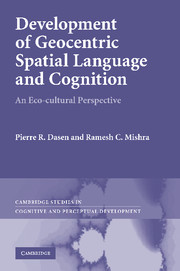3 - Settings
Published online by Cambridge University Press: 02 December 2010
Summary
In this chapter, we present all of the sites used in this research, starting with Bali, because that is where we carried out our very first study in 1994, and then India and Nepal (both the locations of the first study in 1999–2000 and those of the main study), and Switzerland. Although the results will be presented in separate chapters by location, it seemed to make sense to present the settings in a single chapter.
We consider this chapter to be very important in this volume, because our general interpretation of the results is that the “choice” between spatial frames of reference depends to a large extent on a set of ecological and socio-cultural variables, which we describe at the group level in this chapter. Some of these have actually been measured at the individual level, and the results are described in the relevant chapters.
The amount of detail provided for each location varies, but should in any case be enough to give a feel for the local daily life. Our emphasis is, of course, on the orientation system predominantly used in each location, including examples of its daily use, and its symbolic significance. Language used for describing space may be mentioned on the basis of ethnographic observations, while the actual language produced on language elicitation tasks is presented in each separate chapter. Actual examples for each language category in each of the languages used in the various locations are presented in Appendix 2.
- Type
- Chapter
- Information
- Development of Geocentric Spatial Language and CognitionAn Eco-cultural Perspective, pp. 76 - 106Publisher: Cambridge University PressPrint publication year: 2010

